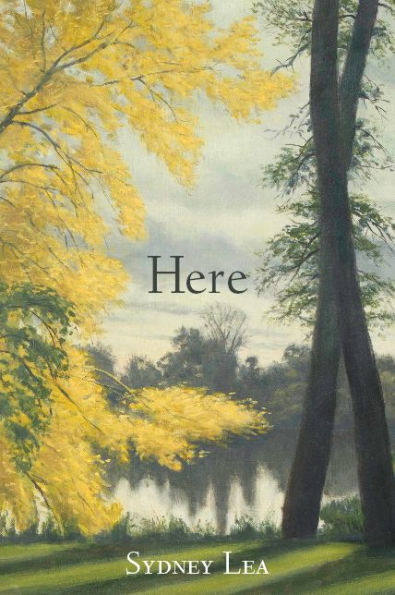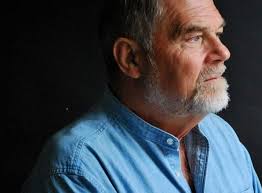Sydney Lea sounds a bittersweet middle C in his new book Here as he recounts the salient events of his life. Reminiscing in his muscular yet tender poems about ordinary events that trigger ironically extraordinary narratives, Lea finds way to instill his experiences with cathectic imagery. And not only experiences but “things” as well — such cynosures as a “dark snapper who skulked in his uncle’s spring house,” a conflagration of giant hemlocks, spruce, and fir “cross-lake from where I drifted,” a glass of spilled milk, an old dog, a host of birds, a Ukrainian egg, an old Studebaker, to mention just a few. Lea overhears himself in these poems with a naturalist’s sensibility that betrays the influences of Robert Penn Warren, Robert Frost, and William Wordsworth. But Lea writes in a style that’s more prosy than these influences, transforming memories into evocative frissons of lived moments, life-changing encounters, coruscating scenes, and indelible losses. He is a raconteur par-excellence with a poet’s eye and ear.
 In poem after poem of this lyric autobiography, Lea undertakes one of the most difficult challenges for a poet, namely the daunting task of filling in the blanks between the lines of Ecclesiastes, particularly the proverbial refrain: “Vanities of vanities … what has been will be again, / what has been done will be done again, there is nothing new under the sun”— an aphorism that could serve as an epigraph for every poem in Here. Lea takes this ancient axiom to heart but then shows that despite the mortal redundancy that each new generation is fated to repeat, at least the poet can add new commentary to the static human story in his own particular time and voice.
In poem after poem of this lyric autobiography, Lea undertakes one of the most difficult challenges for a poet, namely the daunting task of filling in the blanks between the lines of Ecclesiastes, particularly the proverbial refrain: “Vanities of vanities … what has been will be again, / what has been done will be done again, there is nothing new under the sun”— an aphorism that could serve as an epigraph for every poem in Here. Lea takes this ancient axiom to heart but then shows that despite the mortal redundancy that each new generation is fated to repeat, at least the poet can add new commentary to the static human story in his own particular time and voice.
But how to do this without developing what might be called “a serious thinking problem”? Like all strong poets, especially “confessional” poets who focus on their own experiences, Lea obviates the pitfall of bathos by creating a “live” current between himself and others, whether those others be people, animals, things or his reader. With a remarkable memory for details that turn into immense particulars and metaphors, Lea crosses over from himself to his reader with a charged language that acknowledges Qoholeth’s wisdom implicitly, while at the same time conjuring original expression that infuses old “vanities” with new meaning, as in these lines from “My Wife’s Back”:
I am fixed
On your back, indifferent to other wonders:
Bright minnows that flared in the shallows,
The gleam off that poor mink’s coat,
Even the fleas in its fur, the various birds
-the lust of creatures just to survive.
Bur I watch your back. Never have I wished more not to die.
 Lea’s memories, griefs, and epiphanies not only strike deep emotional chords in the poet, but the reader as well. His affective “possessions” remain solely his while paradoxically evoking deep feeling in his readers. His particular gift for what John Keats called “negative capability,” that is, the ability to exist in uncertainty, mystery, doubt without any irritable reaching after fact and reason,” betrays the efficacy of lyric poetry’s power to turn particulars into verbal transformers that electrify difference with figurative and transpersonal charges, as in these graceful lines from “Easy Wonder”:
Lea’s memories, griefs, and epiphanies not only strike deep emotional chords in the poet, but the reader as well. His affective “possessions” remain solely his while paradoxically evoking deep feeling in his readers. His particular gift for what John Keats called “negative capability,” that is, the ability to exist in uncertainty, mystery, doubt without any irritable reaching after fact and reason,” betrays the efficacy of lyric poetry’s power to turn particulars into verbal transformers that electrify difference with figurative and transpersonal charges, as in these graceful lines from “Easy Wonder”:
You trailed an arm in the water. I love
your arms and your legs, which were tucked in the hull
As if fixed in one place, the sun
shed just the right warmth on us as it floated there.
We floated too between water and air.
as if we’d never be let down.
And these from “I Keep Going At 20 Below”:
Beyond the bird,
beyond the conifers in which it sat,
beyond the outlying mountain –well what passes
even beyond bright air? And who’s to sense it?
Not I. It’s birdsong that prompts such opening phrases.
Beyond all this let time complete my sentence.
Like all poets who understand the mystery of fame and the prerequisite for attaining the daring to write at all, namely an appropriate resignation to “not knowing” the fate of one’s work, Lea writes this in “No Consequence” about a friend who witnessed the untimely death of a brilliant friend:
Indelible in the brain. And so,
I may just write of them soon,
Though I think how my friend beheld the brain
Of a better friend splayed against
A wall in a town so picturesque
It all but beggars the mind.
Lea then goes on in the next stanza to kneel at the altar of poetry with self-effacing humility, aware of fate’s merciless hand, even in light of his illustrious career as an eminent, award-winning poet and former poet laureate of Vermont.
O, I am a poet of no consequence.
The sniper picked one of two
Who walked a quaint old street together.
I feel guilt, not envy, it’s true.
I’m content enough in life to be
So wanting in subject matter.
Lea’s titular “here” — that place Robert Frost called Earth in his poem “Birches” — reiterates Frost’s commentary about the ground to which he returns from his swinging, namely, that Earth is indeed the “right place for love.” Love saturates Lea’s poems with affections he feels for family, wildlife, pets, and life itself. However, he can’t ultimately express just how deeply he feels since that feeling is ineffable. But in his closest approximation to this expression he writes in the final poem of the book titled “Here Itself” this peroration of his joy at being alive:
There is a tough late solitary dahlia
In our flower garden.
A hooded merganser drake is grading.
Like a rusted hinge from our pond.
I notice these things
As it seems to me I haven’t before.
I felt no fear, just wistfulness—
For wife, children, grandchildren, friends.
I had a dress rehearsal for death.
But no, no terror.
Strapped to a gurney, I went off to visit
The wonderful Isness of Was
The Isness of forever.
[Published by Four Way Books on September 3, 2019, 148 pages, $15.95 paperback]